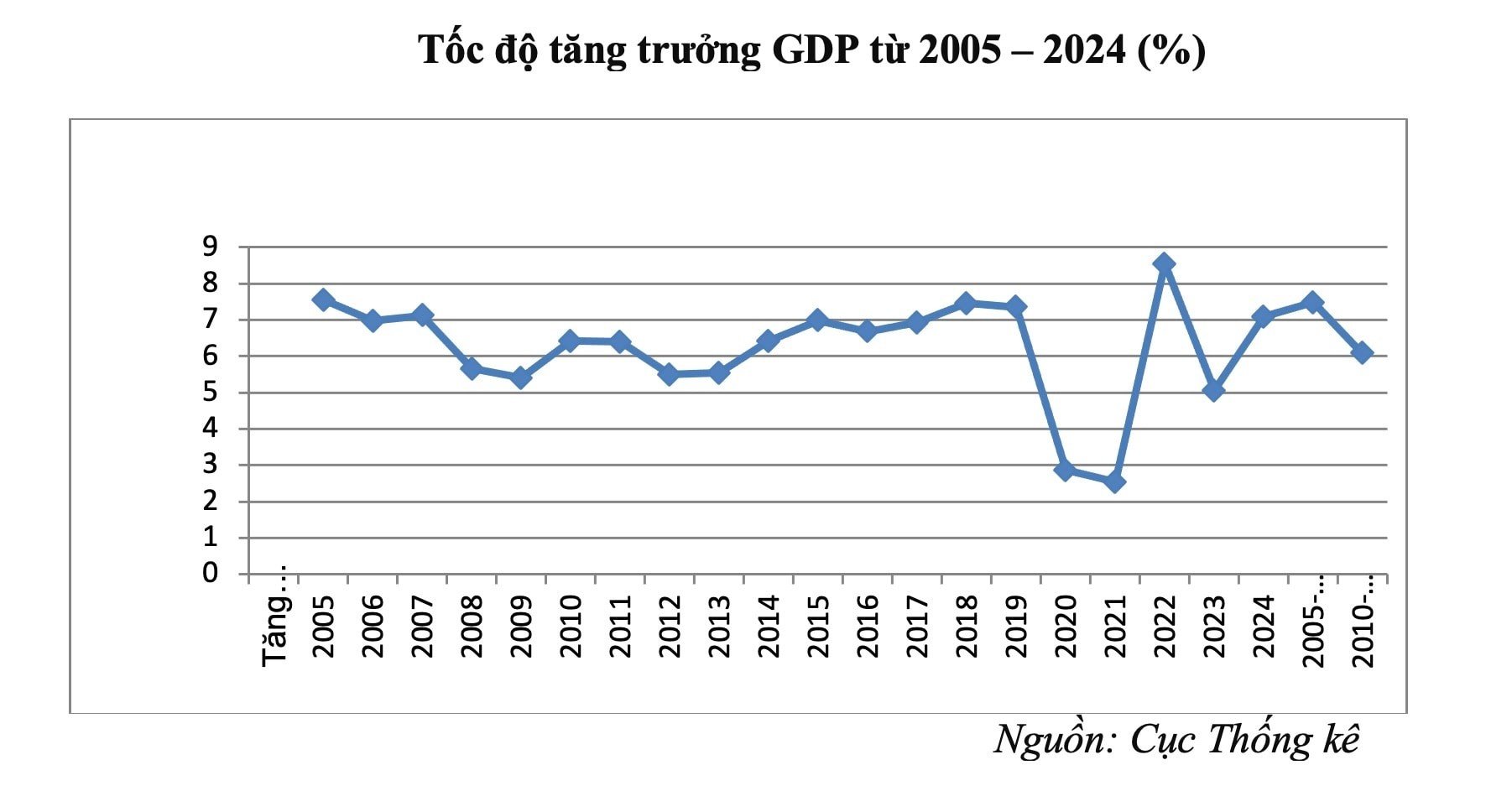Gross domestic product (GDP) is an indicator to measure the size and growth rate of the economy , but it only reflects a part of the national economic picture. In essence, GDP represents the value of the final products created in the economy, but does not fully reflect the process of income distribution and redistribution.
During the 2005 - 2024 period, the average GDP growth rate will reach about 7.5%; during the 2010 - 2024 period alone, it will reach about 6.1%. Notably, 2022 is the only year that records GDP growth exceeding 8% (reaching 8.54%).
GDP growth rate from 2005 - 2024 (Photo: General Statistics Office) |
However, these impressive growth figures are facing many challenges in practice. According to the report on the socio-economic situation in May and the first 5 months of 2025 by the National Statistics Office ( Ministry of Finance ), the country has nearly 111.8 thousand newly established and re-established enterprises. However, the number of enterprises withdrawing from the market is also nearly equivalent, with about 111.6 thousand enterprises.
Notably, recently, many types of goods - from consumer goods to raw materials for production - have been quietly increasing in price. The main reason is the increase in electricity, water, waste treatment costs and especially changes in tax policies for individual businesses.
This development not only increases the consumer price index (CPI) but also pushes up the producer price index (PPI), while causing the profits of enterprises and business households to decrease. As a result, the following production cycles and GDP growth rate in the coming time may not be as expected.
In that context, the core solution is to motivate the private economic sector, with the key point being to build trust in the business community. In recent years, the unstable policy environment, lack of transparency and lack of equality between business types have eroded trust, especially from private enterprises and individual business households. Many businesses are not afraid of market risks, but are worried that making mistakes in administrative procedures and taxes could lead to heavy fines or even legal trouble.
The Politburo 's issuance of four key Resolutions (Resolution No. 57-NQ/TW on breakthroughs in science and technology development, innovation and national digital transformation; Resolution No. 59-NQ/TW on international integration in the new situation; Resolution No. 66-NQ/TW on innovation in law-making and enforcement to meet the requirements of national development in the new era; Resolution No. 68-NQ/TW on private economic development) are the right steps, demonstrating a strong determination for reform. The important thing is to quickly institutionalize, widely communicate and synchronously and resolutely implement them to create substantive changes. This is a process that requires the rightly oriented intelligence, political courage and strong governance capacity - not only from the Party but also from the state administrative apparatus.
More than a technical reform, this is a journey to create a new economic culture, laying the foundation for a strong transformation of the private economic sector. It is a journey of perseverance, steadfastness, patience, and determination ("4K"); of determination, fierceness, willpower, and determination to win ("4Q"); and is fueled by the spirit of confidence, self-reliance, self-reliance, and pride ("4T").
Only when the private economic sector is truly placed at the center of the innovation process, treated equally, strictly protected by law and properly honored by society, can trust be aroused and spread strongly. This is not only a necessary but also a sufficient condition for this sector to promote its role as an important driving force for growth and sustainable development.
According to daibieunhandan.vn
Source: https://thoidai.com.vn/tang-truong-gdp-va-bai-toan-niem-tin-cua-khu-vuc-kinh-te-tu-nhan-214407.html




![[Photo] General Secretary To Lam meets with the Group of Young National Assembly Deputies](https://vphoto.vietnam.vn/thumb/1200x675/vietnam/resource/IMAGE/2025/6/24/618b5c3b8c92431686f2217f61dbf4f6)


![[Photo] Close-up of modernized Thu Thiem, connecting new life with District 1](https://vphoto.vietnam.vn/thumb/1200x675/vietnam/resource/IMAGE/2025/6/24/d360fb27c6924b0087bf4f288c24b2f2)
![[Photo] The 9th Party Congress of the National Political Publishing House Truth](https://vphoto.vietnam.vn/thumb/1200x675/vietnam/resource/IMAGE/2025/6/24/ade0561f18954dd1a6a491bdadfa84f1)







































































































Comment (0)